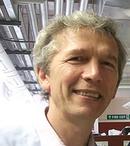Cost: £975
Book a place
Overview
This three-day laboratory-based short course provides up-to-date cell biology techniques. It will give young researchers in life sciences and medicine a framework for further research and experimentation.
During the course you'll:
- attend lectures on the theoretical background to the course
- gain hands-on experience in a range of laboratory techniques
- be guided through the lab practicals at your own pace by a dedicated team of tutors and technicians
The UCL Cruciform medical laboratories will be used for this course.
This course is run by the UCL Division of Biosciences. It's accredited by the RSB for 48 CPD points.
Practicals
The practicals will give you hands-on experience in:
- good cell culture practice, including safety procedures, control of facilities, equipment, reagents
- qualitative characteristics of mammalian cell cultures: cell counting and analysis
- cryopreservation and cell banking
- sterility and microbial contamination tests
- maintenance and manipulation of stem cells, primary and established cell lines under various experimental conditions (mitogenic stimulation, exposure to cellular stresses and major signal transduction inhibitors)
- transient transfection of mammalian cells, expressing wild type and mutant proteins
- immunofluorescent analysis of subcellular localisation of transiently expressed proteins
- quantitative analysis of immunofluorescent images by computer software
- assessing the viability and proliferation of cells grown under various experimental conditions using the MTT Cell Proliferation Assay
In addition, Thermo Fisher Scientific will demonstrate their EVOS imaging system.
Lectures
Lectures will focus on the following topics:
- Whole tissue/cell techniques (immunofluorescence and immunoelectron microscopy, subcellular fractionation, FACS analysis etc.)
- The control of cellular metabolism and growth by signalling pathways
- Interactions between cells and their environments: general principles in cell signalling and signal transduction
- Regulation of cell survival and proliferation in mammalian cells
- Cell biology underlying vertebrate limb regeneration
- Stem cell biology in health and disease
- Human pluripotent stem cells in culture
The course will include a lecture by David Gems, Professor of Biogerontology and Deputy Director of the Institute of Healthy Ageing at UCL.
Cost
The standard fee for this course is £975. This includes all laboratory and course materials as well as social functions.
Learning outcomes
On successfully completing this short course you should be able to:
- understand basic anatomy of mammalian cells and the function of organelles
- understand signal transduction pathways, controlling cell growth and size
- understand the concept and key regulatory events in cell division, proliferation and survival
- explain the main principles of cellular metabolism: catabolic and anabolic processes
- explain the effects of ageing on cellular and organismal levels
- explain and critically evaluate deregulation of cellular functions in human pathologies, such as cancer
Further information
More information about this course - including how to register - is available on the UCL Biosciences website.
Course team

Professor Ivan Gout - course organiser
The main focus of Ian's research is the study of basic mechanisms by which cell growth and metabolism are regulated in normal and cancer cells. There are two major areas of interest in his laboratory: a) regulation of cell growth, metabolism and proliferation via the mTOR/S6K pathway and b) the role of Coenzyme A and its derivatives in cellular metabolism and gene expression. The development of novel diagnostic and therapeutic approaches for cancer is the ultimate goal of both programmes - this is pursued through collaboration with academic and industrial partners.
Professor David Gems - lecturer
David Gems is Professor of Biogerontology within the Division of Biosciences at UCL. He's also Deputy Director at the Institute of Healthy Ageing.A major focus of his current work is understanding the genes and biochemical processes by which reduced insulin/IGF-1 signalling and dietary restriction increase lifespan. The lab hopes to unravel the mystery of human ageing using C.elegans as an ideal model organism to study ageing.
Book a place
Course information last modified: 26 May 2023, 15:39
 Close
Close

